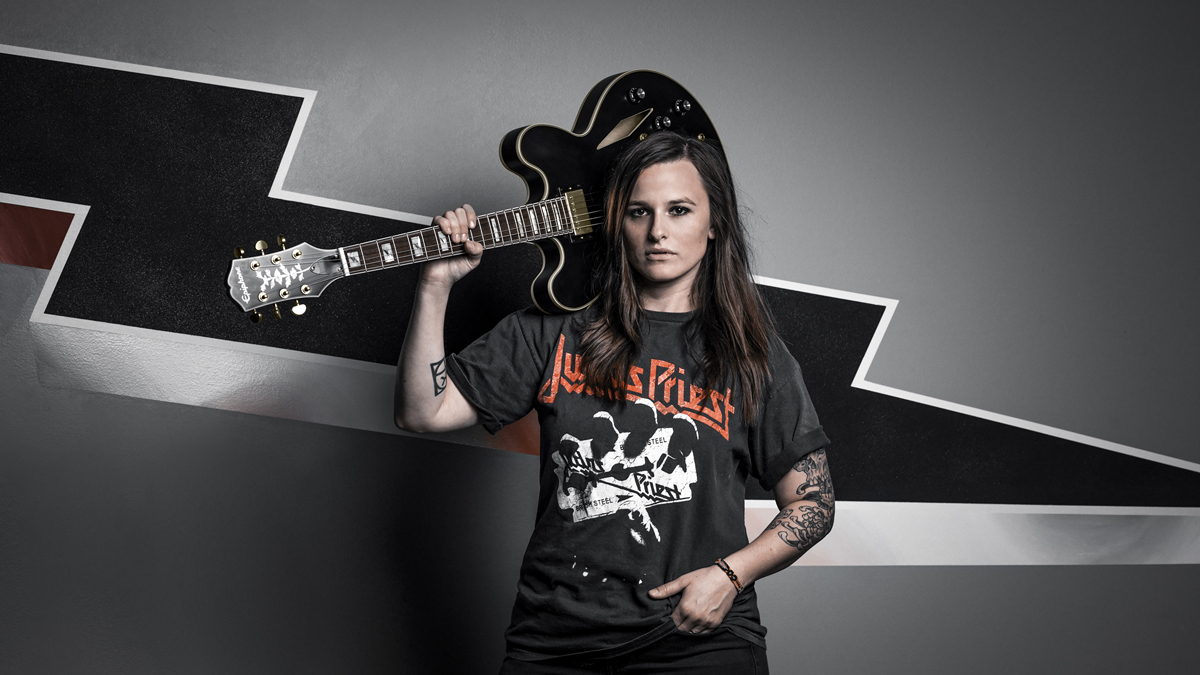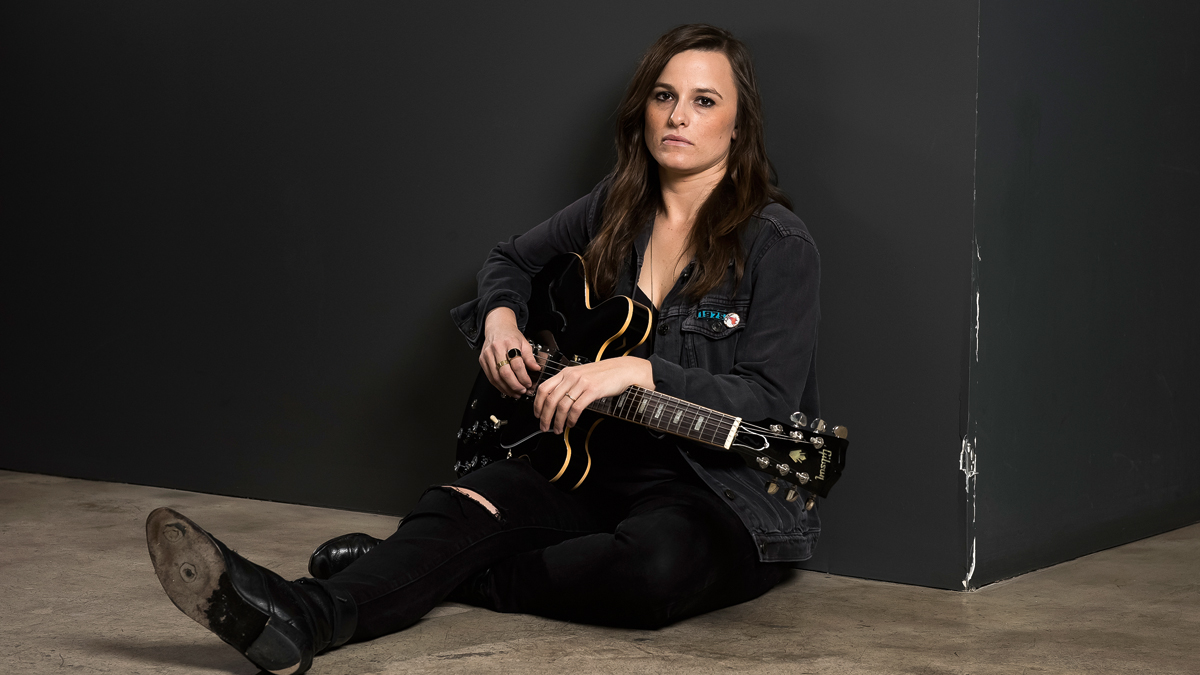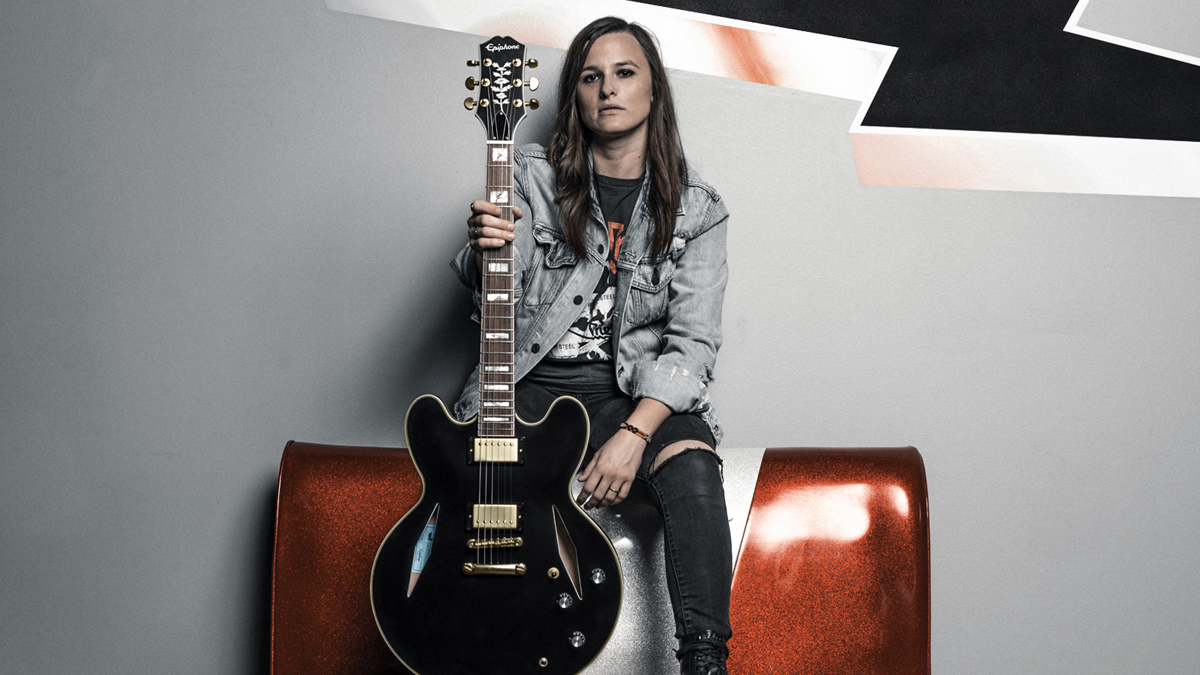Emily Wolfe: “I love to just go off live, but on the record it's going to be out there forever, so I need to make sure every note matters”
Armed with a signature guitar and monster pedalboard, Wolfe ventures beyond blues on her experimental second album, Outlier

In recent years, Emily Wolfe has established herself as an electrifying blues-rock artist thanks to her incendiary live performances and fierce soloing capabilities.
While gigging has been off the cards for the past year, she’s directed her creative energy in new directions and to spectacular effect – with the release of her second studio album, the genre-blending Outlier, and the launch of her first signature guitar, the Epiphone Sheraton Stealth.
The highest degree of recognition for a guitar player is surely to have their own signature instrument designed and made to their exacting specifications and it’s an accolade which, in her modest way, Emily is still coming to terms with: “I don’t think it’s sunk in yet,” she says. “And I don’t know if it ever will, because it is something that I’ve dreamed of having since I was little. I didn’t think that it would happen this early. It’s mainly just exciting and kind of mind-blowing!”
The project came about after Emily was approached by Epiphone at NAMM following a live performance she and her band gave at the Gibson stand back in 2018. “I guess it was a good one,” she laughs.
“Usually you have to be this kind of monster – like, your career has been happening for a thousand years. But it’s cool that Epiphone is starting to work with emerging artists for that kind of stuff.”
The collaboration also indicates the long overdue shift towards creating female-inspired designs that do not use femininity as a marketing tool. Says Emily: “In the past, women have been really under-represented in the gear world. Or if they have been represented, it’s been sexualised.
“So, to be able to be at the forefront of gear and showing what a woman can do with it – that says a lot about where we’re going. Gear companies, run by men, are really starting to open up their minds to including women and putting them at the forefront, because what they’ve been doing has been a pattern for so many years, and it’s time to try something different.”
Get The Pick Newsletter
All the latest guitar news, interviews, lessons, reviews, deals and more, direct to your inbox!
All style and all substance, there is no mistaking that the Stealth is a serious instrument, with the serious job of busting assumptions and cutting to the chase at the core of its design aesthetic: “I was trying to make something that spoke to what I'm trying to do as an artist,” she explains. “Yeah, I’m a female guitar player. But just go listen to the music!”

Vintage and contemporary aesthetics collide beautifully in the Stealth in what Emily describes as a visual “mix between aggression and elegance.” It has a sleek, black aged gloss finish, lightly aged gold hardware and diamond-shaped F-holes – a first for any Epiphone hollowbody and a feature of which Emily is particularly proud.
It features Epiphone Alnico Classic PRO humbuckers and strikingly, the bridge tone knob has been removed – as Emily’s personal preference is simply never to use it.
With heavy involvement in the design from start to finish, Emily explains how these features were honed to perfection, with a few challenges along the way:
“After the road test, I was like, we need to fix these pickups. The first prototype had really high output pickups and then with the diamond F-holes, the feedback was insane, literally unplayable. It was crazy. And so they suggested low output pickups, and I was really bummed about it because I thought it would make it less aggressive. But it was a good call because it doesn’t feedback anymore unless you want it to.”
I wanted to be subtly proud of it because it is my signature, but I didn’t want it to be like, ‘This is mine!’. Whoever buys it, I want it to be theirs
The Stealth’s ’60s-style Kalamazoo headstock is adorned with a mother of pearl tree of life inlay on the front, while Emily’s wolf logo and gloss-black-on-matte-black "stealth" signature sit out of the spotlight on the rear – and not by oversight: “I wanted to be subtly proud of it because it is my signature, but I didn’t want it to be like, ‘This is mine!’.
“Whoever buys it, I want it to be theirs. I want it to feel like a part of them, the way that it feels like a part of me. I felt like the best way to do that would be to subtly only be able to see my signature on the back if you look at it in a certain light.”
Testament to how inseparable the Stealth and its owner have become, it’s just about the only guitar Emily used on the new record, which was produced by Queens Of The Stone Age bassist Michael Shuman, and which marries her rock roots with her love of pop.
The album marks a divergence from Emily’s self-titled first album as it steps intrepidly out of the blues-rock box into a less-travelled environment of synths, soaring choruses and self-restraint.
She explains: “I think musicians who I really admire, kind of have this restraint. Especially with guitar solos. Live, I love to just go off, but on record it’s going to be out there forever and I need to make sure that whatever I play is concise and that every note matters.”
Album opener No Man presents a powerful introduction to the record's aesthetic, as jagged synth and fierce guitar trade places in helping deliver the song’s message of female self-sufficiency.
LA/NY provides one of the album’s most “traditionally” climactic solos, while Death Row Kiss boasts an opening riff reminiscent of Josh Homme or Jack White in its filthy grooviness. The album is an unpredictable ride.
I do think at this point in time it’s almost like we’re at this renaissance phase, where to stay relevant you have to be irrelevant – you have to make up your own shit
As is the way with more and more of contemporary artists, Emily’s sound is freed by the increasing acceptance that genres are there to be played with rather than conformed to. She loves Judas Priest and Ariana Grande in equal measure, and the record is sonic proof that there’s absolutely nothing wrong with that.
“I do think at this point in time it’s almost like we’re at this renaissance phase,” she says, “where to stay relevant you have to be irrelevant – you have to make-up your own shit. You gotta get out of boxes because they’ve been there so long and everybody’s heard it. I wanted to take all these different eras of music that I love – from the '60s to the '90s – and add on what’s going on today in the pop world and see what came out of it.”
This knack for mixing the classic and the contemporary – as with the aesthetics of the Stealth – seems to come naturally to Emily. The acceptance of synths, however, took a little more persuasion: “I had to take down my guard a bit," she says, “because I had made this decision, before I met Michael, of ‘no synths in my band!’ I met him and he convinced me, because he found the right sound.”
Under the tutelage of Shuman, Emily eventually embraced synths so much that she started to experiment with effects to make her guitar take on similar tonal qualities, and this is one of the defining characteristics of the album’s sound.
The trick to achieving such a tone, she explains, is the use of an Earthquaker Tentacle: “It’s basically an octave pedal with no fuzz. I figured out that if you put this before a fuzz pedal and then you kick on the neck pickup and then play up around the 12th fret, it makes it sound really synth-y – it adds this kind of oscillation. In LA/NY, when you hear that choppy synth sound, it’s actually that.”
On taking this new, open-minded approach to tones and textures, Emily recalls: “It was really scary! I’d always taken the approach of thinking about how to do it live with three people. And I didn’t realize but it was pretty limiting, because there’s only so much you can do with drums, bass and guitar.”

With the new record, she explains, “It was a case of being as creative as possible in the studio and figuring out how to recreate it later.” A self-confessed gear-head, Emily recently built an absolutely monstrous pedalboard in order to do just that.
In what she describes as “a labour of love and a labour of frustration,” the new ’board has an RJM Mastermind PBC/10 as its integral feature – a switching unit that allows her to program pedal presets by song.
Emily also uses a Klon KTR overdrive, JHS Whitey Tighty compressor, EarthQuaker Dirt Transmitter and, of course, the Tentacle.
As for replicating the vast, almost imposingly close-sounding dynamics of the record live with just a three-piece band, she hints, “There’s some tricks! There’s SPD-S pads and then there’s a stereo amp thing and a mimic pedal to create the stereo image of the guitars.”
Armed with the Stealth, an open mind and some great new songs, Emily Wolfe is poised for a major breakthrough in 2021. “I know I’m taking a less-is-more approach” she says, “and putting more emphasis on the songs and how well I can craft them. But I’ll always rope in all the influences that I love, and how much I love guitar.”
- Outlier is out now via Crows Feet Records.
Since graduating university with a degree in English, Ellie has spent the last decade working in a variety of media, marketing and live events roles. As well as being a regular contributor to GuitarWorld.com, she currently heads up the marketing team of a mid-scale venue in the south-west of England. She started dabbling with guitars around the age of seven and has been borderline obsessed ever since. She has a particular fascination with alternate tunings, is forever hunting for the perfect slide for the smaller-handed guitarist, and derives a sadistic pleasure from bothering her drummer mates with a preference for wonky time signatures.
“The rest of the world didn't know that the world's greatest guitarist was playing a weekend gig at this place in Chelmsford”: The Aristocrats' Bryan Beller recalls the moment he met Guthrie Govan and formed a new kind of supergroup
Carlos Santana hospitalized following pre-show medical emergency



![[from left] George Harrison with his Gretsch Country Gentleman, Norman Harris of Norman's Rare Guitars holds a gold-top Les Paul, John Fogerty with his legendary 1969 Rickenbacker](https://cdn.mos.cms.futurecdn.net/TuH3nuhn9etqjdn5sy4ntW.jpg)







